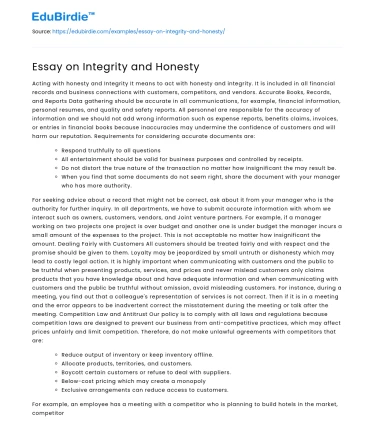Introduction
Integrity and honesty are foundational virtues that underpin social cohesion and trust. These principles are not only crucial in personal life but also in the professional and academic arenas, forming the bedrock upon which ethical behavior is built. Integrity, defined as the quality of being honest and having strong moral principles, is crucial for fostering a trustworthy environment. Honesty, the act of being truthful and transparent, is a complementary virtue that supports integrity. Together, they create a framework within which individuals and institutions can operate effectively and ethically. In a world where moral relativism often challenges absolute truths, maintaining integrity and honesty is increasingly vital. This essay explores the significance of these virtues, illustrating their importance through real-life examples and scholarly insights, while addressing potential counter-arguments to underscore their relevance in contemporary society.
The Role of Integrity and Honesty in Personal Development
Integrity and honesty play a pivotal role in personal development, acting as guiding principles for individuals striving to achieve self-fulfillment and societal respect. The cultivation of these virtues begins early in life, often influenced by family, education, and cultural norms. A person who consistently demonstrates integrity and honesty earns the trust of others, which is essential for forming meaningful relationships and networks. As noted by Carter (1996), "Integrity is doing the right thing when no one is watching," highlighting the intrinsic value of these virtues beyond external validation.
Save your time!
We can take care of your essay
- Proper editing and formatting
- Free revision, title page, and bibliography
- Flexible prices and money-back guarantee
In the realm of personal growth, integrity ensures that individuals are aligned with their values and beliefs, leading to a coherent and authentic life. This alignment fosters self-respect and inner peace, as individuals are not torn between conflicting values and actions. Furthermore, honesty is integral to self-awareness and personal accountability, as it encourages individuals to confront their flaws and limitations candidly. For instance, acknowledging one's mistakes and learning from them is a crucial aspect of personal development that hinges on honesty.
Counter-arguments suggest that absolute honesty can sometimes lead to undesirable outcomes, such as hurt feelings or conflict. However, proponents of integrity and honesty argue that constructive communication, underpinned by these virtues, can resolve conflicts and build stronger relationships. Thus, while absolute transparency may not always be feasible, the intent to be truthful and maintain integrity should guide one's actions. The personal growth facilitated by these virtues ultimately contributes to a more ethical and harmonious society.
Integrity and Honesty in Professional and Academic Contexts
In professional and academic environments, integrity and honesty are indispensable for fostering trust and credibility. These virtues are critical for ensuring fairness, accountability, and transparency, which are essential for effective governance and ethical decision-making. In academia, integrity is epitomized by adherence to ethical standards in research and scholarship. Plagiarism, data fabrication, and other forms of academic dishonesty undermine the credibility of educational institutions and the validity of research findings.
The corporate world similarly values integrity and honesty as fundamental to sustainable success. Companies that prioritize ethical practices and transparent communication tend to build strong reputations and customer loyalty. The case of the Enron scandal serves as a stark reminder of the consequences of neglecting these virtues. Enron's fraudulent practices, driven by a lack of integrity and honesty, ultimately led to its collapse, causing financial ruin for stakeholders and employees alike.
Critics might argue that in certain competitive industries, a degree of deception or unethical behavior could lead to short-term gains. However, such practices are unsustainable and often result in severe repercussions, including legal penalties and loss of reputation. As articulated by Warren Buffett, "It takes 20 years to build a reputation and five minutes to ruin it." Therefore, integrity and honesty are not only ethical imperatives but also strategic assets that contribute to long-term success and resilience in professional settings.
Challenges and Opportunities in Upholding Integrity and Honesty
Despite their importance, upholding integrity and honesty can be challenging in a world rife with ethical dilemmas and pressures. Individuals and organizations often encounter situations where these virtues are tested, such as conflicts of interest or competitive pressures. However, these challenges also present opportunities for reinforcing ethical standards and demonstrating moral leadership.
Organizations can foster a culture of integrity and honesty by implementing robust ethical guidelines and providing training on ethical decision-making. Encouraging open dialogue and creating an environment where employees feel comfortable raising ethical concerns are also crucial steps in promoting these virtues. Moreover, leaders who model integrity and honesty inspire their teams to follow suit, reinforcing the organization's commitment to ethical conduct.
On a personal level, individuals can cultivate integrity and honesty through self-reflection and continuous learning. Engaging with diverse perspectives and seeking feedback can enhance one's understanding of ethical issues and strengthen moral reasoning. While the journey towards unwavering integrity and honesty is ongoing and fraught with challenges, it ultimately leads to personal growth and societal betterment.
Conclusion
In conclusion, integrity and honesty are indispensable virtues that underpin ethical behavior and societal trust. These principles are essential for personal development, fostering self-respect and authenticity. In professional and academic contexts, they ensure accountability and credibility, laying the groundwork for sustainable success. While challenges to upholding these virtues exist, they also present opportunities for reinforcing ethical standards and demonstrating leadership. By embracing integrity and honesty, individuals and organizations contribute to a more ethical and harmonious society. As the world continues to navigate complex moral landscapes, these timeless virtues remain as relevant as ever, guiding actions and decisions towards a more just and equitable future.






 Stuck on your essay?
Stuck on your essay?

